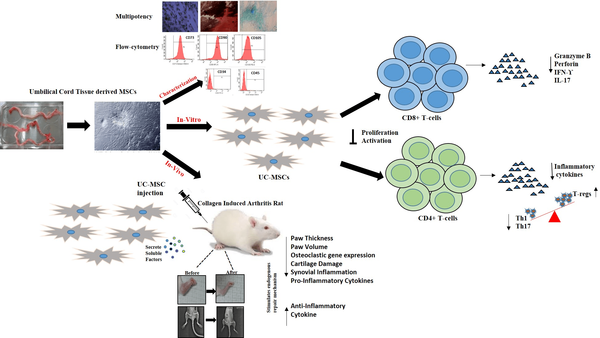-
Home
-
About JCTR
-
Gold Open Access
-
Issues
-
Editorial board
-
Author guidelines
-
Publication fees
-
Online first
-
Special issues
-
News
-
Publication ethics
-
Partners
-
Submit your manuscript
-
Submit your review report
-
Editorial Office
-

This work is licensed under a Creative Commons Attribution-NonCommercial 4.0 International License. ISSN print: 2382-6533 ISSN online: 2424-810X
Volume 6 Issue 6
Human umbilical cord derived mesenchymal stem cells induce tissue repair and regeneration in collagen-induced arthritis in rats
Mehak Vohra, Aman Sharma, Rashmi Bagga and Sunil K. Arora*
Vohra et al, J Clin Transl Res 2020; 6(6):3
Published online: December 11, 2020
Abstract
Background: The immunosuppressive and anti-inflammatory properties of mesenchymal stem/stromal cells (MSC) have prompted their therapeutic application in several autoimmune diseases including rheumatoid arthritis. MSCs derived from bone marrow and adipose tissue have earlier been tried with limited success. However, Wharton’s jelly present in human umbilical cord is discarded after delivery which makes a rich source of MSCs with least ethical issues.
Method: The immunomodulatory properties of human umbilical cord derived MSCs (UC-MSCs) were evaluated in-vitro on the mononuclear cells from synovial fluid and peripheral blood of rheumatoid arthritis patients. The therapeutic potential of UC-MSCs was checked by transplanting the cells in rats with collagen induced arthritis (CIA).
Results: MSCs isolated from Wharton’s Jelly significantly suppressed the proliferation and activation of lymphocytes from both peripheral blood as well as synovial fluid of RA patients, down-modulated the functions of activated CD4+, CD8+ T-cells, suppressed the secretion of pro-inflammatory cytokines and induced the expansion of T-regulatory cells. Xeno-transplantation of UC-MSCs in CIA rats clearly indicated a sustained impact in terms of slowing down the progression of disease activity and reversal of arthritic processes along with triggering of joint tissue repair mechanisms, which could be observed till six weeks post-transplantation.
Conclusion: The results from the current study suggest that human umbilical cord is a rich source of MSCs for allo-transplantation. The UC-MSCs may be used successfully as a cell-based therapeutic option either in isolation or in conjunction with existing therapeutic drugs, not only to relieve the joint inflammation but also regenerate the damaged bone and cartilage tissues in arthritis.
Relevance to Patients: The current study highlights the potential use of MSCs as a cell based therapeutic option for the treatment of inflammatory rheumatoid arthritis.

DOI: http://dx.doi.org/10.18053/jctres.06.202006.003
Author affiliation
1. Department of Immunopathology, Post Graduate Institute of Medical Education & Research, Chandigarh-160012, India.
2. Department of Internal Medicine (Rheumatology), Post Graduate Institute of Medical Education & Research, Chandigarh-160012, India.
3. Department of Obstetrics & Gynecology, Post Graduate Institute of Medical Education & Research, Chandigarh-160012, India.
*Corresponding author:
Sunil K. Arora
Department of Immunopathology, Post Graduate Institute of Medical Education & Research, Chandigarh-160012, India
Email: arora.sunilkumar@pgimer.edu.in
Handling editor:
Michal Heger
Department of Pharmaceutics, Utrecht University, the Netherlands
Department of Pharmaceutics, Jiaxing University Medical College, Zhejiang, China

